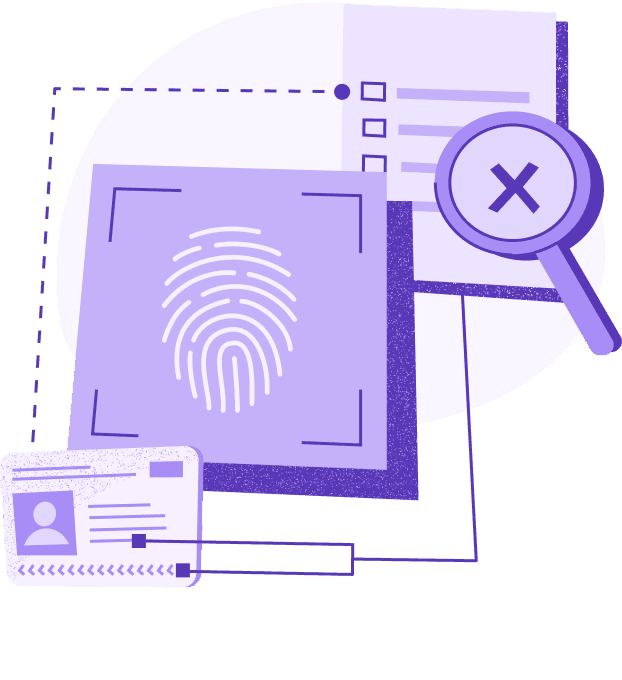Article
5 min read
A Guide to Employee Background Checks in South Korea
Employee background checks
Legal & compliance

Author
Michał Kowalewski
Last Update
September 05, 2025

Table of Contents
What you need to know before ordering a background check in South Korea
Are background checks legal in South Korea?
Types of background checks that are illegal in South Korea
Industries where background checks are common in South Korea
Types of employee background checks in South Korea
Background check mistakes to avoid in South Korea
Step-by-step guide to employee background checks in South Korea
Run employee background checks with Deel
Key takeaways
- When hiring in South Korea, it’s crucial to obtain candidates' written consent before conducting background checks to ensure compliance with the Personal Information Protection Act (PIPA) and guidelines set by the Personal Information Protection Commission (PIPC)
- Background checks are particularly relevant in sectors like finance, healthcare, technology, and education, where verifying qualifications and integrity is essential for maintaining high standards and protecting sensitive information
- Employers must avoid practices such as collecting excessive or sensitive information without consent, unauthorized financial and medical checks, and any form of discrimination, to prevent legal repercussions and ensure ethical hiring practices
Employee background checks should be an integral part of your hiring process in South Korea. Although not mandatory, they are a common practice, especially in finance, healthcare, tech, and education.
Global companies might find South Korea an attractive place for hiring due to its strong emphasis on high-tech industries and innovation. The country is Asia’s third largest economy and is known for its highly skilled workforce, particularly in information technology and related fields.
What’s more, South Korea's leadership in high-tech sectors includes healthcare, industrial chemicals, IT components, semiconductor manufacturing, aerospace and defense, energy, environmental technology, and transportation. Which makes South Korea a perfect partner for many US businesses.
Given that context, knowing how to conduct thorough background screenings can prove to be very advantageous for global companies looking to hire in South Korea.
In this article, you’ll learn:
- How to run an effective and legal employment screening in South Korea
- What the common types of employee checks are in South Korea
- How to conduct a thorough employee screening, step by step
- What mistakes to avoid when performing a background check in South Korea
What you need to know before ordering a background check in South Korea
An employee background check is the process of verifying a potential hire’s work history, education, professional qualifications, and any criminal records they might have. It’s particularly beneficial to run a background check before finalizing an employment offer or signing a contract to ensure the candidate meets the company's standards and requirements.
When running background checks in South Korea, employers need to follow privacy laws and regulations to ensure the legality of their recruitment process. Bear in mind that although it’s not specified in the law, written consent is recommended for documentation and compliance purposes.
- Personal Information Protection Act (PIPA) governs the collection and handling of personal information in South Korea, including that used in background checks. The PIPA mandates that individuals' consent must be obtained before conducting background checks, ensuring the protection of personal information across various sectors, including employment. The recent amendment to PIPA, effective from September 15, 2023, introduced significant updates such as enhanced protection for children's personal information and unified data breach notification requirements for both online and offline businesses
- The enforcement and interpretation of PIPA are overseen by the Personal Information Protection Commission (PIPC), which issues guidelines and ensures compliance with data protection laws. The PIPC's role has become increasingly crucial with the global shift towards stricter data privacy regulations
- Cultural values in South Korea place a strong emphasis on privacy and confidentiality, affecting the manner in which personal information is handled and background checks are conducted. Employers and organizations are expected to navigate these cultural expectations carefully, ensuring compliance with legal requirements while respecting individuals' privacy rights
Are background checks legal in South Korea?
Background checks are legal in South Korea, but they must comply with the regulations set forth in the Personal Information Protection Act and Personal Protection Commission.
Employers are required to obtain consent from job applicants before initiating a background check. Failure to adhere to these regulations can result in legal consequences for the employer, including fines and reputational damage.
Compliance
Types of background checks that are illegal in South Korea
In South Korea, certain types of background checks are restricted or prohibited entirely. Global employers should stay clear of the following prohibited practices:
- Collecting excessive information: Avoid gathering data not directly relevant to job qualifications
- Sensitive data without consent: It's illegal to access information like health records or religious beliefs without explicit consent
- Unauthorized financial checks: Conducting credit history checks without the applicant's consent is illegal in South Korea. Employers must obtain explicit permission from the candidate before accessing their credit information
- Unauthorized medical checks: South Korean law prohibits employers from conducting medical history checks as part of the background check process. This aligns with the country's commitment to protecting the privacy of individuals' health-related information
- Discrimination: Discriminatory practices based on protected characteristics are prohibited
- Data security negligence: Employers must protect personal data from unauthorized access or breaches
Companies in South Korea that violate privacy regulations related to background checks can face significant penalties. These might include administrative fines, corrective orders, and potential criminal charges depending on the severity of the violation. For detailed information on penalties and compliance, employers can consult resources such as the Personal Information Protection Commission.
Industries where background checks are common in South Korea
In South Korea, various industries rely on employee background checks to ensure the integrity and reliability of their workforce. Some of the common industries where background checks are prevalent include:
- Financial services: Given the sensitive nature of roles in the financial sector, background checks are prevalent to verify the integrity and trustworthiness of employees
- Healthcare: Background checks are common in the healthcare industry to ensure patient safety and compliance with regulatory requirements
- Technology: With a focus on protecting intellectual property and sensitive data, technology companies often conduct thorough background checks on potential employees
- Education: Schools and educational institutions may conduct background checks to guarantee the safety of students and to comply with educational standards and regulations
Types of employee background checks in South Korea
Effective employment screening in South Korea covers essential aspects to evaluate a candidate's abilities. Knowing these areas helps employers tailor screening processes to meet job requirements and legal standards.
| Type of check | Common in South Korea? | Reason |
|---|---|---|
| Criminal record check | Less common | The process of conducting criminal background checks in South Korea is not an easy one, and is only required for certain jobs, i.e. teaching |
| Employment history | Common | Important for assessing the candidate's work experience, performance, and integrity |
| Qualifications verification | Common | Ensures the candidate possesses the required education and skills for the role |
| Credit history check | Less common | While relevant for certain roles, such as those involving financial responsibilities, credit checks are less common and require the candidate's explicit consent |
| Reference check | Common | Provides insights into the candidate's character and work ethic through past colleagues or supervisors |
| Social media screening | Less common | Increasingly common, this involves reviewing a candidate's public online presence to gather insights into their behavior, character, and professionalism |
| Drug testing | Less common | While drug testing is not explicitly prohibited or regulated by specific laws for employment purposes, employers should obtain the individual's consent and ensure the process is relevant to their job requirements |
Background check mistakes to avoid in South Korea
Whether you’re hiring employees or contractors in South Korea, there are a few things you shouldn’t do as an employer when it comes to background checks:
- Conducting unauthorized checks: Failing to obtain explicit consent before conducting a background check can lead to legal repercussions for employers
- Disregarding privacy regulations: Ignoring the provisions of the Personal Information Protection Act when handling personal information during background checks can result in fines and legal sanctions
- Relying on unverified sources: Depending on unverified or unauthorized sources for background check information can compromise the accuracy and legality of the process
- Discriminatory practices: Employers must avoid using background check information to discriminate against candidates based on factors such as age, gender, or disability
- Lack of transparency: Failing to communicate the results of the background check to the candidate in a clear and timely manner can damage trust and the employer's reputation
Step-by-step guide to employee background checks in South Korea
Employers looking to hire in South Korea should follow the steps below to ensure legal and effective and thorough employee background checks:
- Obtain consent: Before initiating a background check, employers must obtain written consent from the job applicant, clearly stating the purpose and scope of the check
- Identify information sources: Determine the relevant sources for background checks, such as educational institutions, previous employers, and criminal record databases
- Verify educational background: Confirm the candidate's educational qualifications by contacting the respective educational institutions or using third-party verification services
- Verify employment history: Contact previous employers to authenticate the candidate's work history, positions held, and reasons for leaving
- Check criminal record: Conduct a criminal record check through authorized channels to ensure compliance with legal requirements and to assess the candidate's suitability for the role
- Reference checks: Reach out to provided references to gain insights into the candidate's professional capabilities and work ethic
- Document the process: Maintain records of the background check process, including the consent form, communication with information sources, and findings
- Assess findings: Evaluate the information obtained through the background check to make informed hiring decisions
- Inform the candidate: Communicate the results of the background check to the candidate in a transparent and respectful manner
- Data protection compliance: Ensure that the handling of personal information during the background check process complies with the provisions of the Personal Information Protection Act
You can also automate this process using Deel, and get the results of a fast employee background check within minutes.
Background checks
Run employee background checks with Deel
There’s no need for HR to log into yet another platform or manually chase documents. With screenings in over 200 countries and territories (and counting), for employees and contractors, you can manage background checks for global hires with a single source of truth without leaving the Deel platform.
Are you looking for an easy way to run a fast background check? Look no further, and let Deel take care of that for you.
After exploring various providers, it's clear that Deel is the best on the market. We were able to hire approximately 40 employees in the Philippines within a matter of months. Their background check process was easy and effective and made us feel safe about hiring in new markets. We're truly grateful for the opportunity to work with this team!
—Bree Cohen,
VP of Talent, Power Digital Marketing

Michał Kowalewski a writer and content manager with 7+ years of experience in digital marketing. He spent most of his professional career working in startups and tech industry. He's a big proponent of remote work considering it not just a professional preference but a lifestyle that enhances productivity and fosters a flexible work environment. He enjoys tackling topics of venture capital, equity, and startup finance.
















